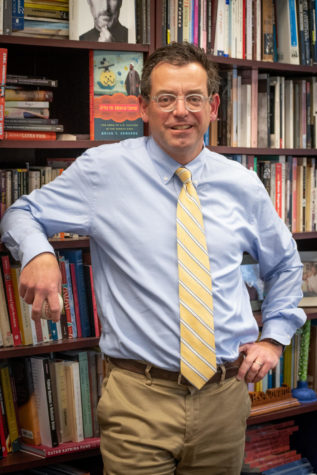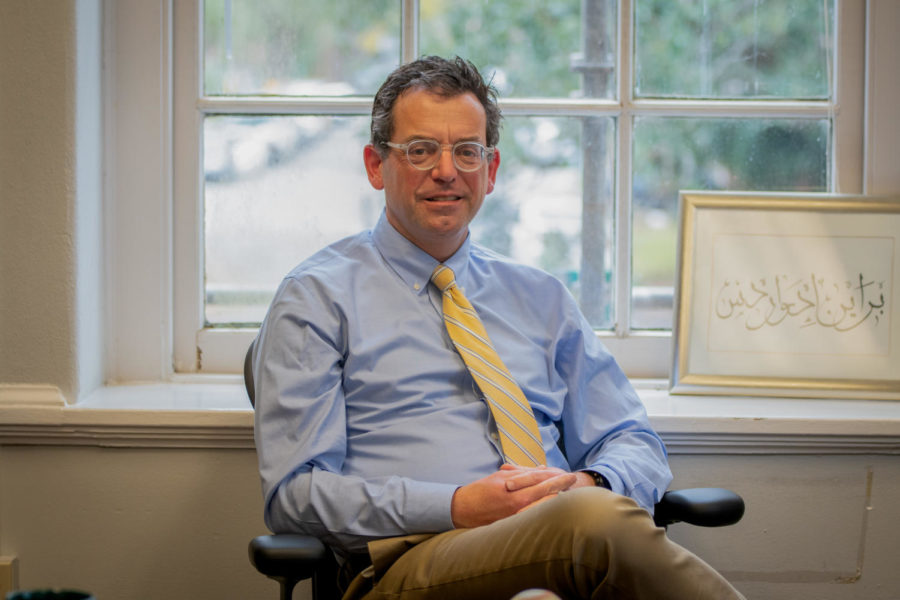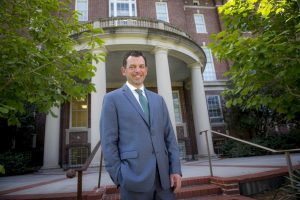SLA’s Edwards on future of liberal arts
February 21, 2022
Brian Edwards’ office suite does not have the grandeur of other rooms on campus. Acoustic ceiling tiles, fluorescent lighting and carpet more reminiscent of a 1970s office make it hard to remember that you’re in a century-old building on the National Register of Historic Places.
The photographer is, understandably, concerned about the lighting. Edwards’ Executive Assistant, Joe Mistrot, is more concerned about Edwards’ tie.
Dean Edwards is most concerned about defending his bookshelves. They’re filled with works ranging from faculty authors like Jesmyn Ward and Walter Isaacson to classic standards like Graham Greene.
“This is just the overflow from the house,” Edwards said. A baseball in hand, he ambled from window to bookshelf as the photographer clicked away.
The sheer volume of books is unsurprising, perhaps, for a professor of English and a prolific writer of both creative nonfiction and academic text.
“When we moved down here,” Edwards said, “the bookshelves in this office were empty for quite a few months.”
To be clear, the dean said, it was not because he didn’t read. When Edwards and his family moved from Evanston, Illinois, they donated or gave away, by his best guess, close to 1,000 books — or about “one of these bookcases.”
At one point, Edwards bounded from his chair and calculated aloud the number of books on his office shelves.
He was, in fact, remarkably close to 1,000.
But the empty shelves had less to do with reading and more to do with Edwards settling into his new role and his new office.
Four years later, he has. Needless to say, Edwards is a voracious consumer and producer of the written word. Before his time as dean, Edwards’ researched the American conception of the Maghreb and the cultural exchange between the United States and the Middle East.
His most recent monograph’s somewhat ominous title, “After the American Century,” belies Edwards’ clear optimism about the nature of the country and the future of liberal arts.
For an Americanist, at least by degree and dissertation, Edwards’ thinking has an unusually global perspective.
That transnational perspective is evidenced not just by his research but by his hopes for the School of Liberal Arts.

Liberal arts at Tulane has begun the expansion of the Asian Studies program, created a new administrative position overseeing language instruction and expanded research support and awards for faculty.
For Edwards, those moves are part of “expanding the kind of global perspectives on fields that have sometimes been understood as within a more limiting and limited domestic frame.”
The dean was quick to clarify his point. “Which is not to say, being the United States, we don’t need to understand much more about our own society, history and culture — we do.”
“But to put it within a transnational kind of perspective, is also to understand things in a more global frame,” Edwards said.
That means bringing a global perspective to disciplines like gender and sexuality studies or environmental studies.
Edwards is also a notable advocate for language learning in the liberal arts.
In a 2015 Chronicle of Higher Education article — a breakfast table read for many university administrators — Edwards wrote that “a creeping monolingualism” was overtaking American liberal arts.
It was imperative, Edwards wrote, that American students learn languages — any language — but specifically that they learn Arabic.
“If the United States is going to try to understand, rather than bomb, invade, and occupy part of the world that has been our government’s central obsession for almost a decade and a half,” Edwards said, “then more colleges need to teach Arabic and do so in a vibrant way. Higher education has never had a more crucial role to play in achieving peace.”
Edwards was keen to clarify.
“It wasn’t really only about Arabic,” he said. Rather, it was to emphasize a point that in an interconnected world, a more global liberal arts education is required.
But expanding research grants and language offerings, hiring faculty — combatting the “adjunctification” that faculty nationally are experiencing — and perhaps most obviously renovating Newcomb Hall requires money.
Deans are not just gifted academics and adroit administrators — their work also includes development, or raising money and cultivating donors.
Edwards’ role is no exception. For him, part of SLA’s fundraising campaign is improving and modernizing their buildings.
“We occupy 17 buildings on the Uptown campus,” Edwards said.
The beating heart of the SLA is Newcomb Hall, where Edwards’ office is located.
“In the case of Newcomb Hall,” he said, the goal is to “take the shell, essentially, of a great building, a beautiful, iconic building, and then redesign the inside for liberal arts education of the next century.”
Edwards’ vision for Newcomb unfolds in stages. The first stage draws from one of the key lessons COVID-19 imparted — the need for adaptable working and gathering spaces, responsive to the needs of their variable occupants.
Edwards says that elevating SLA isn’t just about physical plant. He considers recruiting and retaining faculty, alongside research support, just as important.
At the moment, Tulane faculty compensation lags behind peer groups.
Another goal is the realization of dedicated homes for “interdisciplinary programs that have never had spaces for themselves.”
That aim can be challenging, Edwards said, given the limited expansion space Uptown.
But even with the acoustic tiling, scaffolding and tight space, Edwards is clearly optimistic.
“It’s incredibly interesting and exciting to be at Tulane in these years, because we’re able to innovate so much,” he said.
This article has been corrected. Brian Edwards’ monograph was referred to as After the End of the American Century. It is titled After the American Century: the Ends of U.S. Culture in the Middle East.










jack ellsley • Feb 24, 2022 at 9:46 am
“”School of Liberals”…lol